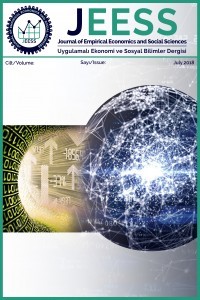THE RELATIONSHIP BETWEEN CREDIT CARD EXPENDITURES, CONSUMER CONFIDENCE AND CONSUMERS' SAVING TENDENCIES
THE RELATIONSHIP BETWEEN CREDIT CARD EXPENDITURES, CONSUMER CONFIDENCE AND CONSUMERS' SAVING TENDENCIES
Consumer confidence index, saving, expenditure ARDL Model Application,
___
- Altınöz, U. (2014). “Tüketim Fonksiyonu ve Türkiye için Gelir-Tüketim İlişkisinin Ampirik Analizi”, International Conference on Eurasian Economies, Sinop Üniversitesi.
- Arisoy, İ. and Aytun, C. (2014). "Türkiye'de Tüketim Harcamalari, Krediler ve Tüketici Güveni Arasindaki Iliskilerin Analizi/An Empirical Analysis of the Relations among Consumer Expenditures, Consumption Credits and Consumer Confidence in Turkish Economy." Business and Economics Research Journal 5(2), 33.
- Başarır, Ç., Bicil, İ.M., and Yılmaz, Ö. (2019). “The relationship between selected financial and macroeconomic variables with consumer confidence index”. Journal of Yasar University, 14(special issue), 173-183.
- Çağlayan, E. (2006), “Enflasyon, Faiz Oranı ve Büyümenin Yurtiçi Tasarruflar Üzerindeki Etkileri”, Marmara Üniversitesi, İ.İ.B.F. Dergisi, Cilt: 21, Sayı:1, s. 423-438.
- Çil yavuz N. (2015). Finansal Ekonometri, DER Yayınları, 2. Baskı, İstanbul.
- Ekeocha, P. C., Ekeocha, C. S., Malaolu, V., and Oduh, M. O. (2012). “Modelling the long run determinants of foreign portfolio investment in Nigeria”. Journal of Economics and Sustainable development, 3(8), 194-205.
- Eryüzlü, H. (2020), “Tüketici güven endeksi ve tüketici kredileri çok yönlü nedensellik ilişkileri: Türkiye örneği”. Bilim-Teknoloji-Yenilik Ekosistemi Dergisi, 1(1), 47-53.
- Esen, E., Yıldırım, S. and Kostakoğlu, S. F. (2012). Feldstein-Horioka hipotezinin Türkiye ekonomisi için sınanması: ARDL modeli uygulaması. Eskişehir Osmangazi Üniversitesi İİBF Dergisi, 7(1), 251-267.
- Ewing, B. T., & Payne, J. E. (1998). “The long-run relation between the personal savings rate and consumer sentiment.” Journal of Financial Counseling and Planning, 9(1), 89.
- https://data.tuik.gov.tr/Kategori/GetKategori?p=sanayi-114&dil=1 (Erişim Tarihi 15.12.2021)
- Kłopocka, A. M. (2016). “Does consumer confidence forecast household saving and borrowing behavior? Evidence for Poland”. Social Indicators Research, 133(2), 693–717.
- Klopocka, A.M., and Gorska, R. (2021). “Forecasting household saving rate with consumer confidence indicator and its components: panel data analysis of 14 European countries”. European Research Studies Journal, 24(3), 874-898.
- Loría, E., and Brito, L. (2004). Is the consumer confidence index a sound predictor of the private demand in the United States?. Estudios de economía aplicada, 22(3), 795-809.
- Ngobo, P. V., and Ingarao, A. (2017). The influence of consumer confidence on inter-format competition: An analysis based on the French Consumer Confidence Index. Recherche et Applications en Marketing (English Edition), 32(4), 2-31.
- Oduh, M.O., Oduh, M.O., and Ekeocha, P. (2012). “The impact of consumer confidence and expectation on consumption in Nigeria: Evidence from panel data”. European Journal of Business and Management, 4(9), 86-100.
- Pesaran, M.H. and Shin, Y. (1999). An Autoregressive Distributed Lag Modelling Approach to Cointegration Analysis", Faculty of Economics, University of Cambridge, Cambridge Working Papers in Economics, Working Paper No: 9514, ssp. 1-24.
- Shefrin, H. M. and Thaler, R. H. (1988). The behavioral life‐cycle hypothesis. Economic inquiry, 26(4), 609-643.
- Sönmezler, G., Gündüz, İ. O., and Torun, M. (2019). “Türkiye’de Kredi Karti Harcamalari İle Tüketici Güven Endeksi ve Enflasyon Arasindaki İlişki Üzerine Ampirik Bir Çalişma”. Çukurova Üniversitesi Sosyal Bilimler Enstitüsü Dergisi, 28(1), 17-29.
- Thaler, R. (1999). “Mental Accounting Matters”. Journal of Behavioral Decision Making. Vol.12. pp. 183-206.
- Tversky, Amos and Kahneman, D. (1986). “Rational Choice and the Framing of Decisions”. The Journal of Business. Vol.59. No.4. Part 2: The Behavioral Foundations of Economic Theory. pp. 251-278.
- Vanlaer, W., Bielen, S., and Marneffe, W. (2019). Consumer confidence and household saving behaviors: A cross-country empirical analysis. Social Indicators Research, 147(2), 677-721.
- Yamak, R., Yamak, N., and Erkan, E. (2019). “Tüketim fonksiyonu ve tüketici güven endeksi”. Kafkas Üniversitesi İktisadi ve İdari Bilimler Fakültesi Dergisi, 10(19), 533-558.
- Zanbak, M., Özgür, R. Ö., and Çiçeker, E. (2022). “Tüketici Güven Endeksi ile Seçilmiş Makro Değişkenler Arasındaki İlişkinin Johansen Eşbütünleşme ve Nedensellik Analizi: Türkiye Örneği”. Gaziantep
- ISSN: 2667-7210
- Başlangıç: 2018
- Yayıncı: Burak DARICI
HERZBERG’İN ÇİFT FAKTÖR TEORİSİ: TURİZM ÇALIŞANLARI ÜZERİNDE FENOMENOLOJİK BİR ARAŞTIRMA
ENERGY TRANSITION AS A SOCIO-TECHNICAL CHANGE PROCESS INDUCED BY CLIMATE CHANGE
Melike ÇETİNBAKIŞ, Şeyma ŞAHİN KUTLU
MESAFENİN TÜRKİYE’NİN İHRACATINA ETKİSİNDE ALTERNATİF BİR YAKLAŞIM: TAŞIMA MODLARI
